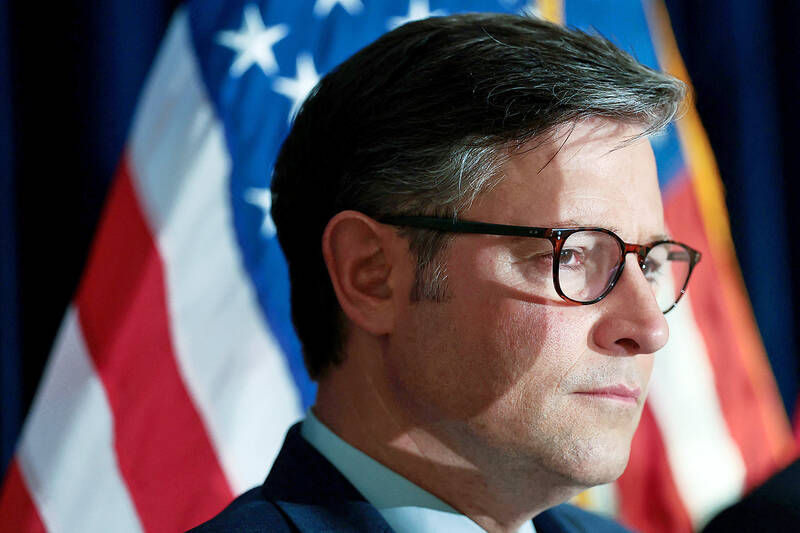Iranian hackers sought to interest US President Joe Biden’s campaign in information stolen from former US president Donald Trump’s campaign, sending unsolicited e-mails to people associated with the then-Democratic candidate in an effort to interfere in November’s election, the FBI and other federal agencies said on Wednesday.
There was no indication that any of the recipients responded and several media organizations who have said they also were approached with stolen material did not publish it, officials said.
The presidential campaign of US Vice President Kamala Harris called the e-mails from Iran “unwelcome and unacceptable malicious activity” that were received by only a few people who regarded them as spam or phishing attempts.

Photo: AFP
The announcement was the latest US government effort to call out what officials say is Iran’s brazen, ongoing work to interfere in the election, including a hack-and-leak campaign that the FBI and other federal agencies linked last month to Tehran.
The hackers sent e-mails in late June and early July to people who were associated with Biden’s campaign before he dropped out.
The e-mails “contained an excerpt taken from stolen, non-public material from former president Trump’s campaign as text in the e-mails,” a statement released by the FBI, the Office of the director of National Intelligence and the Cybersecurity and Infrastructure Security Agency said.
The agencies have said the Trump campaign hack and an attempted breach of the Biden-Harris campaign were part of an effort to undermine voters’ faith in the election and to stoke discord.
The Trump campaign on Aug. 10 said that it had been hacked, and that Iranian actors had stolen and distributed sensitive internal documents.
At least three news outlets — Politico, the New York Times and the Washington Post — were leaked confidential material from inside the Trump campaign. So far, each has refused to reveal any details about what it received.
Politico reported that it began receiving e-mails on July 22 from an anonymous account.
The source — an AOL e-mail account identified only as “Robert” — passed along what appeared to be a research dossier that the campaign had apparently done on the Republican vice presidential nominee, US Senator J.D. Vance. The document was dated Feb. 23, almost five months before Trump selected Vance as his running mate.
In a statement, Harris campaign spokesperson Morgan Finkelstein said that the campaign has cooperated with law enforcement since learning that people associated with Biden’s team were among the recipients of the e-mails.
“We’re not aware of any material being sent directly to the campaign; a few individuals were targeted on their personal e-mails with what looked like a spam or phishing attempt,” Finkelstein said. “We condemn in the strongest terms any effort by foreign actors to interfere in US elections including this unwelcome and unacceptable malicious activity.”
Trump campaign national press secretary Karoline Leavitt called the effort to dangle stolen information to the Biden campaign “further proof the Iranians are actively interfering in the election” to help Harris.
Intelligence officials have said that Iran opposes Trump’s re-election bid, seeing him as more likely to increase tension between Washington and Tehran.

Former Nicaraguan president Violeta Chamorro, who brought peace to Nicaragua after years of war and was the first woman elected president in the Americas, died on Saturday at the age of 95, her family said. Chamorro, who ruled the poor Central American country from 1990 to 1997, “died in peace, surrounded by the affection and love of her children,” said a statement issued by her four children. As president, Chamorro ended a civil war that had raged for much of the 1980s as US-backed rebels known as the “Contras” fought the leftist Sandinista government. That conflict made Nicaragua one of

COMPETITION: The US and Russia make up about 90 percent of the world stockpile and are adding new versions, while China’s nuclear force is steadily rising, SIPRI said Most of the world’s nuclear-armed states continued to modernize their arsenals last year, setting the stage for a new nuclear arms race, the Stockholm International Peace Research Institute (SIPRI) said yesterday. Nuclear powers including the US and Russia — which account for about 90 percent of the world’s stockpile — had spent time last year “upgrading existing weapons and adding newer versions,” researchers said. Since the end of the Cold War, old warheads have generally been dismantled quicker than new ones have been deployed, resulting in a decrease in the overall number of warheads. However, SIPRI said that the trend was likely

BOMBARDMENT: Moscow sent more than 440 drones and 32 missiles, Volodymyr Zelenskiy said, in ‘one of the most terrifying strikes’ on the capital in recent months A nighttime Russian missile and drone bombardment of Ukraine killed at least 15 people and injured 116 while they slept in their homes, local officials said yesterday, with the main barrage centering on the capital, Kyiv. Kyiv City Military Administration head Tymur Tkachenko said 14 people were killed and 99 were injured as explosions echoed across the city for hours during the night. The bombardment demolished a nine-story residential building, destroying dozens of apartments. Emergency workers were at the scene to rescue people from under the rubble. Russia flung more than 440 drones and 32 missiles at Ukraine, Ukrainian President Volodymyr Zelenskiy

Indonesia’s Mount Lewotobi Laki-Laki yesterday erupted again with giant ash and smoke plumes after forcing evacuations of villages and flight cancelations, including to and from the resort island of Bali. Several eruptions sent ash up to 5km into the sky on Tuesday evening to yesterday afternoon. An eruption on Tuesday afternoon sent thick, gray clouds 10km into the sky that expanded into a mushroom-shaped ash cloud visible as much as 150km kilometers away. The eruption alert was raised on Tuesday to the highest level and the danger zone where people are recommended to leave was expanded to 8km from the crater. Officers also